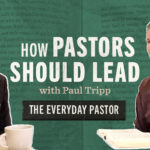Come back next week for five more signs from Paul Tripp that you’ve succumbed to the dangerous “arrival” mindset.
I didn’t see it at the time, but I enjoyed the ministry celebrity that I experienced my early days in coal country. I was the center of a little growing church and a rapidly growing Christian school, and I loved it. We were seeing fruit in a place where there hadn’t been much fruit, and people were excited. Thankful people seem to be everywhere, and they expressed their thanks often. But, in ways I didn’t see then, I took a lot of the credit.
I was unaware of how proud I had become until a man asked if he could meet with me. I was sure he has been convicted by one of my glorious sermons and wished to counsel with me. We met over dinner, a meal that neither one of us ended up eating, and it quickly became clear that he didn’t want to talk about himself. He spent a couple hours offering me example after example of my pride. He said that he thought I thought my job was to give “the final opinion on everything.”
I was devastated. I thought he had been inaccurate and unkind. But I couldn’t escape his words, so I called my brother Tedd to ask him what I should do. Tedd gave me the best and hardest advice. He simply said, “Listen.” In the next few weeks I tried my best to stop, listen, and look. What I saw was a proud man who had begun in subtle and not-so-subtle ways to take credit for what only grace could produce. I heard a man speaking who had forgotten who he was. I saw a young pastor who had already begun to act as if he had arrived.
I wish I could say that I am free of all the self-assessment delusions of my ministry youth. There are times when the congratulatory comments of a thankful hearer morphs into self-congratulation. There are times when I am defensive as someone presumes to question or confront me. There are times when I am too self-aware and not nearly as Christ-aware as I should be. I still struggle with latent self-righteousness , and the praise of others tends to confirm the praise for myself I still carry around in my heart. So I still cry out for help. I still need to be rescued from me. I still have but one hope: the transforming grace of Jesus Christ.
So what are the lifestyle tendencies of a pastor ministering from a position of arrival? If you think you’ve arrived, you will:
Think you don’t need what you preach.
Sinclair Ferguson has said that he determined to be a man who sits under his own preaching. Even your preparation should be an acknowledgement of ongoing need, a cry for divine help and a celebration of ever-present inexhaustible grace. Think Isaiah 6: “I am a man on unclean lips, and I dwell amongst people of unclean lips.”
If you think you have arrived, you prepare material from above for people who sadly still need what you no longer need. Are you desperately hungry for the truths that you regularly prepare to expound to others?
Not be open to the ministry of the body of Christ.
Arrival tends to produce self-sufficiency. If you think you’re wise, you don’t seek out the wisdom of others. If you think you’re mature, you don’t hunger for the protection of others. If you see yourself as a person of mature faith, you don’t seek the courage-giving encouragement of others. If you don’t see your sin, you won’t see the value of confessing it to those who can counsel and warn you. If you think you’re up to whatever temptation will throw at you, you don’t ask for other eyes to watch out for you and other hearts to pray on your behalf.
Arrival, whether conscious or not, will always begin to cut you off from the essential protecting and sanctifying ministry of the body of Christ.
Expect of others the perfection that you think you’ve achieved.
Arrival is not the soil in which pastoral grace grows. People who think of themselves as righteous tend to expect and require of others the same righteousness they think they have achieved. Rather than being the soil in which grace grows, arrival is the soil in which unrealistic expectation, criticism, impatience, and harsh judgments grow.
I can’t tell you how many staff members have shared with me that their relationship to their senior pastor (and these are my words) is more characterized by law than by grace. If you think you are keeping the law, then you are comfortable with throwing the law at others. But if you are grieved at the reality that you daily fall woefully short of God’s requirement, that your rest is not in your own righteousness but in the righteousness of Christ, then you will naturally minister to others the same grace that you so desperately need and so graciously receive from God’s hand.
Feel qualified for more control.
If you are impressed by your own wisdom and strength, if you mount up evidence for your own righteousness, then it makes sense that you would be self-assured. You think you’re capable, ready to deal with whatever God puts on your plate. Because you are convinced that you are strong and wise, it is natural for you to assess that you should be in control. You don’t carry around in you the hunger for wisdom or protection from personal weaknesses.
Let’s be honest. There are too many power struggles in the local church. Gospel ministry easily becomes politicized. Pride causes you to hunger for power (even though you may not know it). The hunger for power causes you to collect ministry allies, and the desire for control causes you to locate ministry enemies. Somehow, some way, gospel ministry has become a political battleground for human power.
This is a form of ministry that has lost its center. Jesus has left the building. A king is being put forward, but not the King. A kingdom is being built, but not the kingdom. If as a pastor you are being pastoral, you are doing it for others, but if as a pastor you have gone political, you are doing it for you.
Download your free Christmas playlist by TGC editor Brett McCracken!
 It’s that time of year, when the world falls in love—with Christmas music! If you’re ready to immerse yourself in the sounds of the season, we’ve got a brand-new playlist for you. The Gospel Coalition’s free 2025 Christmas playlist is full of joyful, festive, and nostalgic songs to help you celebrate the sweetness of this sacred season.
It’s that time of year, when the world falls in love—with Christmas music! If you’re ready to immerse yourself in the sounds of the season, we’ve got a brand-new playlist for you. The Gospel Coalition’s free 2025 Christmas playlist is full of joyful, festive, and nostalgic songs to help you celebrate the sweetness of this sacred season.
The 75 songs on this playlist are all recordings from at least 20 years ago—most of them from further back in the 1950s and 1960s. Each song has been thoughtfully selected by TGC Arts & Culture Editor Brett McCracken to cultivate a fun but meaningful mix of vintage Christmas vibes.
To start listening to this free resource, simply click below to receive your link to the private playlist on Spotify or Apple Music.

































